'For a country that has successfully maintained its democracy for more than seventy years now, this sudden storm of hate is highly surprising.'
'My worry is that if the debate continues like that for some more time you will have an entire generation of Indians permanently inoculated with this germ of hatred.'
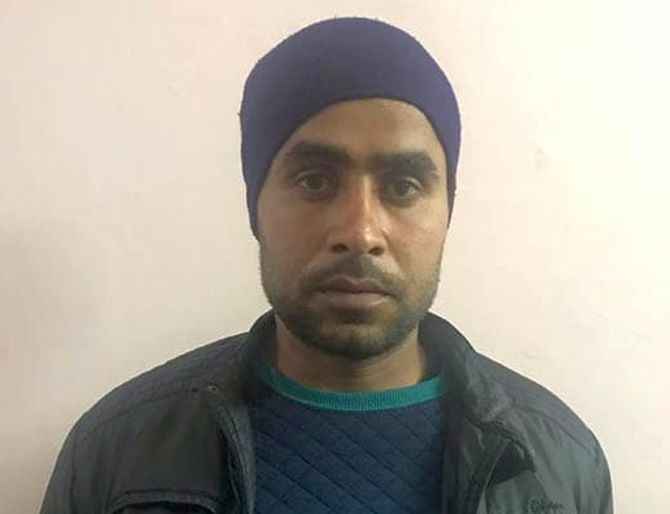
IAS officer Shah Faesal, the first Kashmiri to top the civil services examination in 2010, is currently on study leave and is the Edward S Mason Fellow at the Harvard Kennedy School, Harvard University.
"You can win an election, you can appease the hungry voters by throwing distractions at them, but you can't make a great nation unless you take everyone along," Dr Faesal, below, tells Rediff.com's Archana Masih in an email interview.
How does polarisation, incidents of lynchings, toxic debates peril India as we know it? Is this leading to a climate of hate?
In recent times we have seen the rise of right-wing politics and authoritarian populism across the world, in North America, Latin America, Europe and Australia.
What is worrying about India is that the public debate has gathered an unimaginable level of toxicity within a very short period.
For a country that has successfully maintained its democracy for more than seventy years now, this sudden storm of hate is highly surprising.
My worry is that if the debate continues like that for some more time you will have an entire generation of Indians permanently inoculated with this germ of hatred. It won't be easy to reverse it then.
In the recent state elections, the BJP nominated only 1 Muslim candidate in Rajasthan and MP, the Congress 15 and 3 respectively. In UP where every 5th person is a Muslim -- the BJP did not give a single ticket to a Muslim.
Is the Muslim being worryingly disenfranchised -- what dangers does it pose for the 15% of the population?
These are very worrying statistics. If you try to marginalise and invisiblise a minority as populous as that, you cannot grow as a country. This talk about economic growth, investment, ease of doing business and good governance will remain talk only.
A society which has huge subterranean unrest isn't a good place for investment.
A communally divided country isn't the one where development can happen.
Now that you are back to a classroom in the USA, what do you see as the dominant sentiment in India as the country heads to a general election?
From a distance I can see India moving towards a dangerous precipice.
I am a student of development economics and I am happy that India's GDP is growing at a fast pace and it's one of the least volatile economies in the world.
But I can tell you that this environment of polarisation will never allow India to achieve its full growth potential.
You can win an election, you can appease the hungry voters by throwing distractions at them, but you can't make a great nation unless you take everyone along.
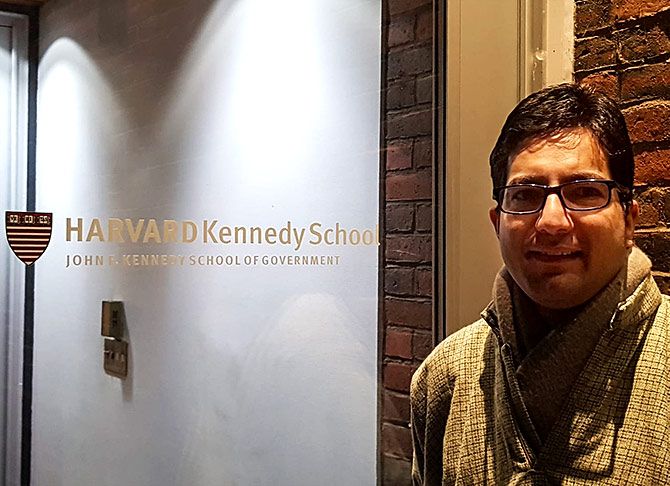
Kashmir has seen another setback after the dissolution of the state assembly. The deep division between the valley and Jammu is further accentuated.
Kashmiris in the security forces have become targets of militants and more and more young men are picking up the gun.
How do you assess your state, a land that you love, today?
In Kashmir we are witnessing very despairing times. The violence has been at an all-time high and the political instability has made the matters worse.
I have always believed that Kashmir is not a development issue, a problem of joblessness or a religious identity issue. It is a political issue which has been there since 1947.
There won't be lasting peace till we address the public sentiment. That sentiment is not very hard to gauge.
There have been calls for right to self-determination, there has been an autonomy narrative, there is a self-rule proposal, the issue of inter-regional reconciliation between Jammu, Kashmir and Ladakh has been getting traction in recent times.
The refusal of the Indian State to acknowledge the political problem is fueling up tempers in Kashmir. We have to be realistic and take a fresh look at Kashmir if we want to see an end to this bloodshed.
What are your thoughts on the rest of India's relationship with Kashmir and Kashmir's relationship with the rest of India?
I am a member of the All India Service now and I won't hesitate to say that as per the Constitution of India, Jammu and Kashmir has a unique relationship with the Union of India.
It is not just another state like Haryana or Rajasthan. There is an Instrument of Accession and Article 370 that define the limits of the powers of the Union.
It is sad that in last seventy years this relationship has gone sour. In recent years with growing religious polarisation in the rest of the country, Kashmiris have become even more sceptical about this relationship.
I have personally been extremely hurt by the way Muslims are being treated in India today and as a Kashmiri my own thinking about India has changed drastically in the last couple of years.
There was alienation once and now its estrangement. I think it must be addressed. With military force we can keep territory but with military force alone we can't keep people.
There is a deadly churning happening in the valley that can engulf entire South Asia into its flames if left unaddressed.
Sooner we listen to the people, the better it is.
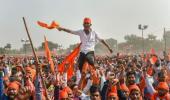
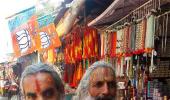

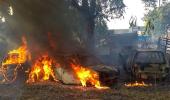







 © 2025
© 2025